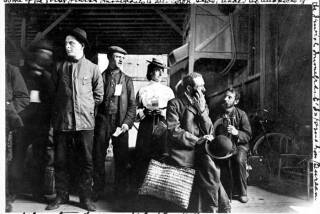Privatizing Social Security: ‘Me’ Over ‘We’
Recent Times coverage.
Social Security privatization has been vigorously challenged on both economic and technical grounds.
It has been said again and again that privatization increases risk for prospective retirees without solving the long-term Social Security financing shortfall (if there actually is one). It has been argued that privatization is merely a scheme to divert money from the Social Security trust fund for speculative stock market investments. And it has been noted that it creates new costs (portfolio management, government oversight) without being able to guarantee workers future retirement benefits.
Yet the most profound cost of privatization has been wholly ignored: the systemic cost to our public way of life. By turning a public social insurance and pension policy into a private bet in which personal and private decisions determine who does well and who does badly, we do irreparable harm to our democratic “common ground.” After all, one of this nation’s greatest public goods has been its promise to give every working family a guarantee of support at retirement, or in case of disability or death. This promise, offered to all citizens, wipes away all the distorting traces of class, race and gender that often play out so dismayingly in the private realm. You cannot simply take justice out of the public realm and put it into the private realm without fundamentally weakening the democracy on which the very possibility of justice depends.
Conservatives ought to recognize even more quickly than liberals that privatization -- whether of education, housing or Social Security -- makes us less of a public. It diminishes the republic -- the res publica, or public things that define our commonweal. It turns the common “we” into a collection of private “me’s.” It opts for market Darwinism, in which smart investors prosper but others lose, rather than social justice as its organizing principle. It demeans the “us” by turning “us” into “it” -- the big, bad, faceless government bureaucracy. And it privileges the private and individual by appealing to market liberty, as if people could really be free one by one or as consumers alone.
Private market liberty is not political liberty; it is only personal choice. It may generate private benefits (“I want an SUV!” or “Give me 100 shares of EBay!”) but offers nothing for the common good (a fuel conservation policy, for instance). It is as citizens that we pay our Social Security taxes, and it should be as citizens that we enjoy the fruits of our labor.
Yet privatization tries to convince us that the consumer is simply another, more efficient, form of the citizen. The citizen who votes with her dollars rather than her ballots. But dollars don’t deliberate. They don’t seek common ground. They are not bearers of empathy and imagination. As education consumers in Chicago or Washington, we can select the “best schools” for our children, but as citizens we need public schools that help make us all public citizens. As consumers in Los Angeles, we can choose among hundreds of automobile models, but only as citizens can we make the choices that create a public transportation system serving all.
Privatization is a kind of reverse social contract: It dissolves the bonds that tie us together. The social contract takes us out of the state of nature; it asks us to give up a part of our private liberty to do whatever we want in order to secure common liberty for all. Privatization puts us back in the state of nature where we possess the natural power to get whatever we can but lose the common power to secure everything to which we have a natural right.
Private choices rest on individual power and skills and on personal luck. Public choices rest on civic rights and common responsibilities. With privatization, this administration is trying to seduce us back into the state of nature, where the strong dominate the weak and anarchy ultimately dominates the strong and the weak, undermining security for both. Under these conditions, Thomas Hobbes reminds us, we are perfectly free to do as we choose, but as a consequence we live lives that are “solitary, poor, nasty, brutish, and short.” Not an ideal recipe for social security.
The Social Security entitlement should not be toyed with and altered in accord with today’s economic fashions. It is an emblem of civic membership and a reflection of the benefits that come with the responsibilities of citizenship.
For us as individuals, privatizing Social Security is probably a bad bet on technical grounds. But for us as citizens, it is a certain disaster. As prospective retirees and private consumers we may want to argue about it, but as citizens, if we care about our democratic republic, we are bound to condemn it.
Benjamin R. Barber is professor of political science at the University of Maryland. He is the author of “Jihad vs. McWorld” (Ballantine, 1996) and other books.
More to Read
Sign up for Essential California
The most important California stories and recommendations in your inbox every morning.
You may occasionally receive promotional content from the Los Angeles Times.










